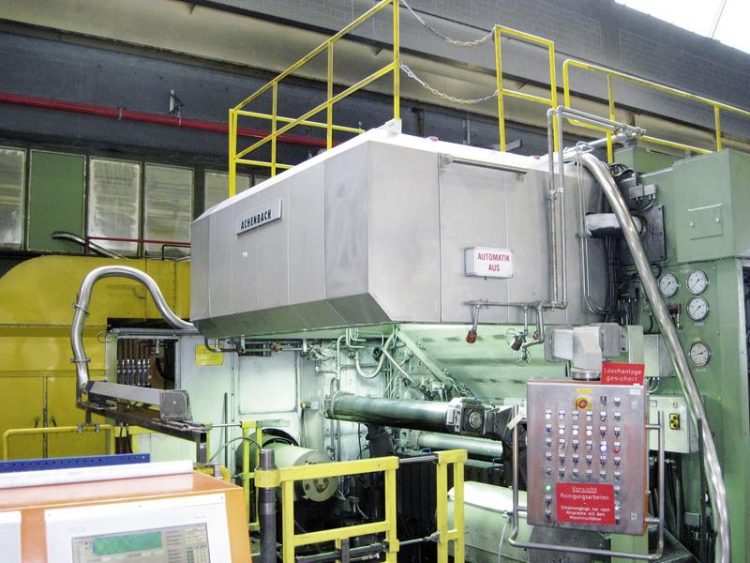Efficient extraction of oil vapours in industry

During cold rolling of aluminium, the required fan power can be halved by a new extraction hood. © Achenbach Buschhütten GmbH & Co. KG
Consumption of less energy when cold rolling aluminium
Compared with older systems, the new extraction hood can feed the oil vapour to the recycling plant with a reduced fan capacity. Until now, the contaminated air could only be extracted non-directionally by the exhaust systems during the cold rolling of aluminium.
This meant that large air volumes had to be moved with corresponding fan power. The oil vapour can now be directionally removed by the extraction hood thanks to an improved design for injecting and removing the air.
This halves the exhaust air volume and the fan output. For cold-rolling mills in the aluminium industry, the extraction systems make up the second-largest energy load after the roll drives with about 20%. Rolling oils are kerosene-like hydrocarbons which, depending on the desired aluminium product, still contain special additives.
The oils are sprayed onto the rolls during cold rolling and partially evaporate.
This oil vapour has to be extracted from the ambient air near the rolling mill in order to ensure the air quality in the factory, prevent a build-up of oil vapour that could exceed the explosion limit and to recycle the expensive material. The project was led by Achenbach Buschhütten GmbH & Co. KG.
You found all informations about the BINE Projectinfo brochure entitled “Extracting fumes in rolling mills” here:
http://www.bine.info/en/press/press-releases/press/pressemitteilung/oeldampf-in-…
Uwe Milles/Birgit Schneider
presse(at)bine.info
About BINE Information Service
Energy research for practical applications
The BINE Information Service reports on energy research topics, such as new materials, systems and components, as well as innovative concepts and methods. The knowledge gained is incorporated into the implementation of new technologies in practice, because first-rate information provides a basis for pioneering decisions, whether in the planning of energy-optimised buildings, increasing the efficiency of industrial processes, or integrating renewable energy sources into existing systems.
About FIZ Karlsruhe
FIZ Karlsruhe – Leibniz Institute for Information Infrastructure is a not-for-profit organization with the public mission to make sci-tech information from all over the world publicly available and to provide related services in order to support the national and international transfer of knowledge and the promotion of innovation.
Our business areas:
• STN International – the world’s leading online service for research and patent information in science and technology
• KnowEsis – innovative eScience solutions to support the process of research in all its stages, and throughout all scientific disciplines
• Databases and Information Services – Databases and science portals in mathematics, computer science, crystallography, chemistry, and energy technology
FIZ Karlsruhe is a member of the Leibniz Association (WGL) which consists of 87 German research and infrastructure institutions.
http://www.bine.info/en – BINE Informationsdienst
Media Contact
All latest news from the category: Power and Electrical Engineering
This topic covers issues related to energy generation, conversion, transportation and consumption and how the industry is addressing the challenge of energy efficiency in general.
innovations-report provides in-depth and informative reports and articles on subjects ranging from wind energy, fuel cell technology, solar energy, geothermal energy, petroleum, gas, nuclear engineering, alternative energy and energy efficiency to fusion, hydrogen and superconductor technologies.
Newest articles

First-of-its-kind study uses remote sensing to monitor plastic debris in rivers and lakes
Remote sensing creates a cost-effective solution to monitoring plastic pollution. A first-of-its-kind study from researchers at the University of Minnesota Twin Cities shows how remote sensing can help monitor and…

Laser-based artificial neuron mimics nerve cell functions at lightning speed
With a processing speed a billion times faster than nature, chip-based laser neuron could help advance AI tasks such as pattern recognition and sequence prediction. Researchers have developed a laser-based…

Optimising the processing of plastic waste
Just one look in the yellow bin reveals a colourful jumble of different types of plastic. However, the purer and more uniform plastic waste is, the easier it is to…



